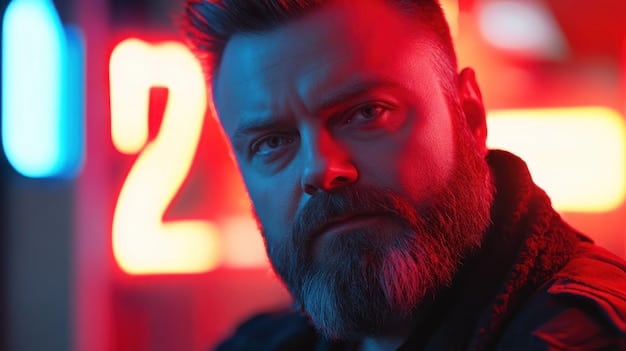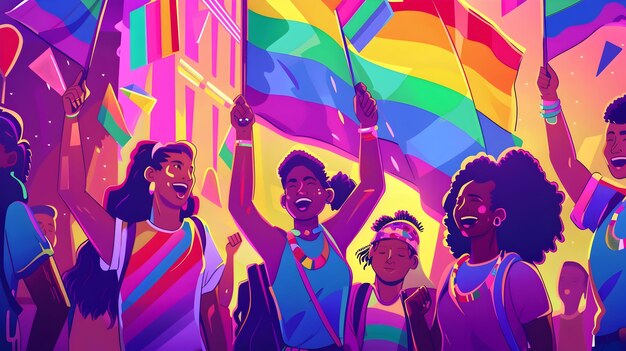The Future of LGBTQ+ Representation in League of Legends Esports

The Future of LGBTQ+ Representation in League of Legends Esports: A Panel Discussion explores how inclusivity and visibility within the gaming community can foster a more welcoming and diverse environment for players and professionals alike.
The gaming world, particularly esports, is constantly evolving, and conversations around diversity and inclusion are becoming increasingly important. A crucial discussion point is the future of LGBTQ+ representation in League of Legends esports: a panel discussion, which sheds light on the challenges and opportunities for LGBTQ+ individuals within this competitive scene.
Understanding LGBTQ+ Representation in Esports
To understand the importance of this panel discussion, it’s essential to consider the current state of LGBTQ+ representation in esports. While gaming has made strides toward inclusivity, LGBTQ+ individuals still face unique challenges.
These challenges include:
- Lack of Visible Role Models: Many aspiring LGBTQ+ players don’t see enough representation at the professional level, making it difficult to envision a viable career path.
- Fear of Discrimination: There’s a concern among LGBTQ+ players about facing prejudice and harassment from teammates, opponents, or fans.
- Limited Opportunities: Some LGBTQ+ gamers may feel that their opportunities are limited due to biases within the industry.
Representation is vital for creating a welcoming and supportive environment. When LGBTQ+ individuals see themselves reflected in esports, it empowers them to participate more openly and confidently. Increased visibility also helps normalize LGBTQ+ identities and challenge stereotypes within the broader gaming community.

Key Discussions from the Panel
The panel discussion on the future of LGBTQ+ representation in League of Legends esports covered a wide range of topics, providing valuable insights into the current landscape and potential pathways for improvement.
The Importance of Safe Spaces
Creating safe spaces within esports is crucial for LGBTQ+ players. These spaces can offer support, mentorship, and a sense of community. Online platforms, Discord servers, and LGBTQ+-inclusive teams can all serve as safe havens.
The Role of Allies
Allies play a vital role in promoting LGBTQ+ inclusion. Allies within the esports industry can use their platform to advocate for LGBTQ+ issues, challenge discrimination, and create a more welcoming environment.
Effective strategies include:
- Speaking Out: Allies can use their voice to publicly support LGBTQ+ rights and challenge discriminatory behavior.
- Providing Support: Offering mentorship and guidance to LGBTQ+ players can help them navigate the challenges they face.
- Creating Opportunities: Allies can actively work to create more opportunities for LGBTQ+ individuals within esports.
The panel emphasized the need for continuous effort from both LGBTQ+ individuals and their allies to create a truly inclusive gaming environment.
Addressing Challenges in the Esports Community
Despite progress, the esports community still struggles with instances of discrimination and harassment. Addressing these challenges requires a multi-faceted approach involving both individual and institutional efforts.
Current challenges include:
- Toxic Behavior: Online toxicity and harassment can disproportionately affect LGBTQ+ individuals.
- Lack of Reporting Mechanisms: Many platforms lack effective reporting mechanisms for addressing discriminatory behavior.
- Insufficient Training: Industry professionals may not have adequate training on LGBTQ+ issues.
Strategies for improvement include:
- Implementing stricter codes of conduct: Establishing clear rules against discrimination and harassment.
- Providing diversity and inclusion training: Educating esports professionals on LGBTQ+ issues.
- Creating transparent reporting systems: Making it easier for individuals to report incidents of discrimination.
By addressing these challenges proactively, the esports community can create a safer and more welcoming environment for LGBTQ+ individuals.

The Impact of Visibility on Aspiring Players
Increased visibility of LGBTQ+ professionals in League of Legends esports can have a profound impact on aspiring players. Seeing role models who are openly LGBTQ+ can inspire confidence and provide a sense of belonging.
Building Confidence
Representation helps build confidence among LGBTQ+ players, encouraging them to pursue their dreams without fear of discrimination. When players see others like them succeeding, it reinforces their belief in their own potential.
Creating Role Models
Visible LGBTQ+ professionals serve as role models for aspiring players. They demonstrate that it’s possible to be successful in esports while being openly LGBTQ+.
Benefits of having visible role models include:
- Inspiration: LGBTQ+ players are inspired to pursue their passion for gaming.
- Validation: Seeing others like them validates their identity and experiences.
- Guidance: Role models can provide mentorship and guidance to aspiring players.
Creating more opportunities for LGBTQ+ individuals to showcase their talents can help foster a more inclusive and vibrant esports community.
Strategies for Promoting Inclusion
Promoting LGBTQ+ inclusion in League of Legends esports requires a combination of individual actions and institutional initiatives. By working together, players, teams, and organizations can create a more welcoming environment.
Team and Organizational Support
Teams and organizations can play a crucial role in promoting LGBTQ+ inclusion by implementing supportive policies, providing resources, and fostering a culture of respect.
Community Engagement
Engaging with the LGBTQ+ community through events, partnerships, and outreach programs can help build relationships and promote understanding. This engagement can foster a sense of belonging and create opportunities for collaboration.
Specific actions include:
- Hosting LGBTQ+-themed events: Creating opportunities for LGBTQ+ gamers to connect and celebrate their identities.
- Partnering with LGBTQ+ organizations: Supporting the work of organizations that advocate for LGBTQ+ rights.
- Implementing inclusive policies: Ensuring that team and organizational policies are inclusive of LGBTQ+ individuals.
By prioritizing inclusion, the esports community can create a more welcoming and supportive environment for all players.
Future Steps for LGBTQ+ Advocacy in Esports
Looking ahead, there are several key steps that can be taken to further LGBTQ+ advocacy in esports. These steps involve continued efforts to raise awareness, challenge discrimination, and promote inclusivity.
Continued Dialogue
Maintaining open and honest dialogue about LGBTQ+ issues is essential for fostering understanding and promoting change. Discussions should focus on addressing challenges, sharing success stories, and identifying opportunities for improvement.
Collaborative Initiatives
Collaborative initiatives involving players, teams, organizations, and advocacy groups can amplify the impact of LGBTQ+ advocacy efforts. By working together, stakeholders can create a more unified and effective approach.
These initiatives may include:
- Developing training programs: Providing resources for esports professionals to learn about LGBTQ+ issues.
- Creating support networks: Establishing networks where LGBTQ+ individuals can connect and support each other.
- Advocating for policy changes: Working to implement inclusive policies within esports organizations.
By taking these steps, the esports community can build a more inclusive and equitable future for LGBTQ+ individuals.
Measuring Progress and Ensuring Accountability
Measuring progress in LGBTQ+ representation and inclusion is crucial for ensuring accountability and guiding future efforts. By tracking key metrics and evaluating outcomes, the esports community can identify areas of success and areas needing improvement.
Tracking Key Metrics
Key metrics for measuring progress may include the number of openly LGBTQ+ players in professional leagues, the representation of LGBTQ+ individuals in leadership positions, and the prevalence of discriminatory incidents.
Regular Evaluations
Regular evaluations of diversity and inclusion initiatives can help assess their effectiveness and identify areas for improvement. These evaluations should involve feedback from LGBTQ+ individuals and other stakeholders.
Evaluating outcomes involves:
- Analyzing data: Reviewing key metrics to assess progress on LGBTQ+ representation and inclusion.
- Gathering feedback: Seeking input from LGBTQ+ individuals and other stakeholders.
- Identifying gaps: Determining areas where efforts are falling short.
By measuring progress and ensuring accountability, the esports community can demonstrate its commitment to creating a truly inclusive environment.
| Key Point | Brief Description |
|---|---|
| 🏳️🌈 Importance of Representation | Visibility matters for LGBTQ+ players to feel seen and supported in esports. |
| 🛡️ Creating Safe Spaces | Safe spaces, both online and offline, provide community and support for LGBTQ+ gamers. |
| 🤝 Role of Allies | Allies in esports can advocate for LGBTQ+ inclusion and challenge discrimination. |
| ⚖️ Accountability | Measuring progress and ensuring accountability are crucial for sustaining inclusivity efforts. |
Frequently Asked Questions
▼
Representation ensures LGBTQ+ players feel seen, valued, and supported, fostering a more inclusive and welcoming community for everyone. Seeing diverse role models encourages participation and breaks down stereotypes.
▼
Organizations can enforce anti-discrimination policies, provide diversity and inclusion training, and support LGBTQ+ initiatives. Partnering with LGBTQ+ organizations further demonstrates commitment to inclusivity and support.
▼
Safe spaces are environments where LGBTQ+ individuals can express themselves without fear of harassment or discrimination. They offer a sense of community, support, and mentorship, crucial for well-being in competitive environments.
▼
Allies use their platforms to advocate for LGBTQ+ rights, challenge discriminatory behavior, and support LGBTQ+ individuals. Their advocacy helps create a more inclusive, safer environment within the esports community.
▼
Progress is measured by tracking the number of openly LGBTQ+ players, their representation in leadership roles, and the reduction of discriminatory incidents. Regular evaluations of inclusion initiatives are also vital.
Conclusion
The panel discussion on the future of LGBTQ+ representation in League of Legends esports emphasizes the importance of creating a more inclusive and supportive environment. By addressing challenges, promoting visibility, and implementing proactive strategies, the esports community can foster a space where LGBTQ+ individuals thrive, contributing to a richer and more diverse gaming world.





